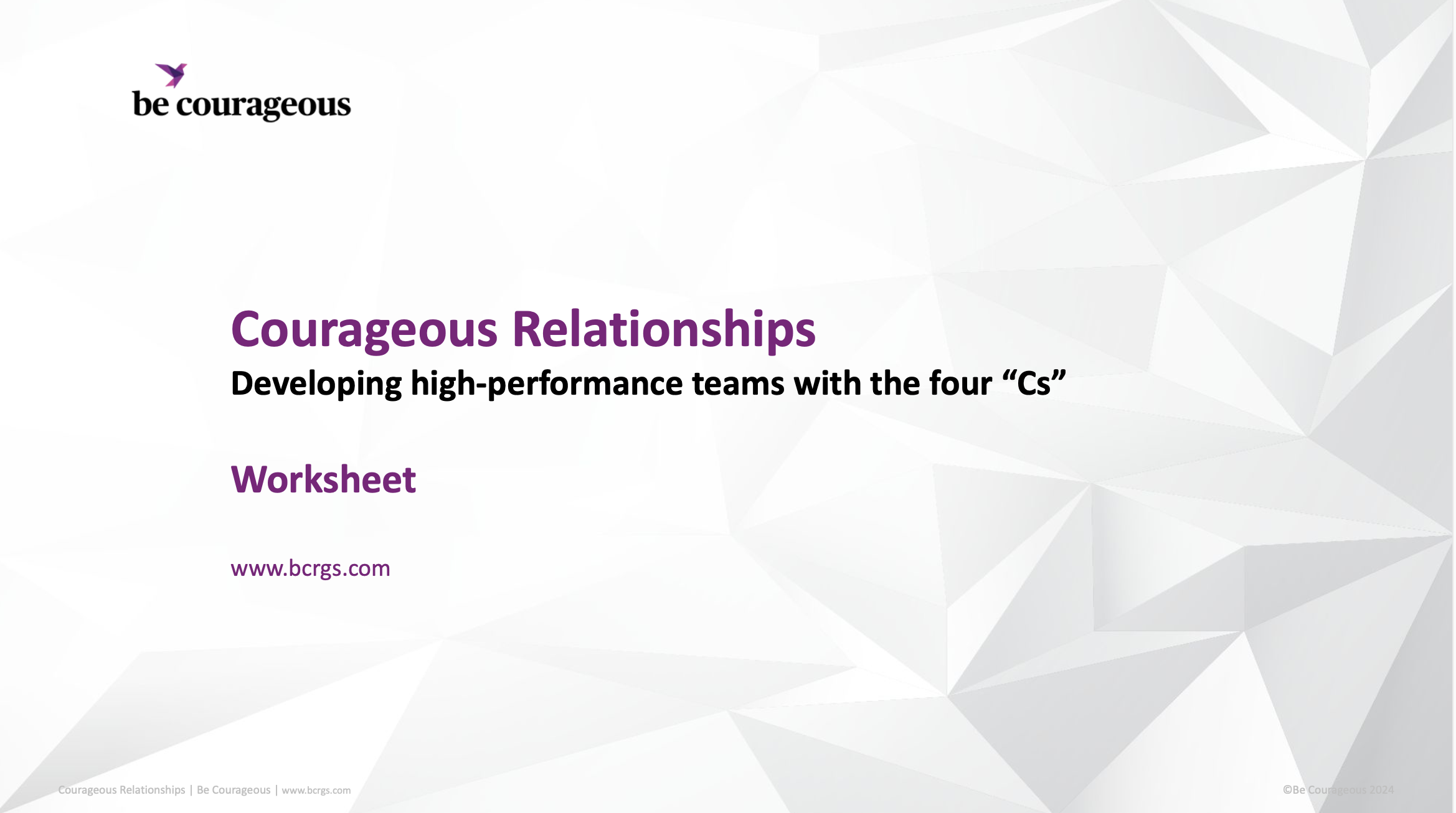Developing High-Performing Teams
As the world becomes more unpredictable and uncertain, we’ve seen in our work with Fortune 1000 companies worldwide a direct correlation in the increase of self-protective and fearful behaviors at work.
More than ever, stemming from what we call “the wounded workplace,” people are having difficulty trusting each other and communicating openly, with clarity, and courage.
We’re hearing statements like:
“I don’t trust my teammates.”
“I don’t know where the company is going.”
“Not everyone is taking accountability.”
“I don’t know if we’re working on the right things.”
“It’s hard to say what I feel; I’m afraid of retaliation or judgment.”
“United we stand, divided we fall.”
– Aesop
Uncertain futures need inter-connected teams
In today’s fast-paced and often turbulent corporate environment, the importance of building deeper connections within teams cannot be overstated.
Out of all the hours in a day, people spend more hours with colleagues than their families. So beyond the basic requirement of coming together to complete tasks, there’s a profound need for teams to cultivate personal connections and foster an environment of mutual trust and respect.
This approach not only enriches the workplace experience but also fortifies teams against the inevitable challenges they will face together.
Humans are social
Humans are inherently social beings, wired to collaborate and support one another.
However, when faced with hardships or traumas that threaten our sense of safety and trust, our instinctive reaction is to shift towards self-protection and disconnection.
This response is often triggered in the workplace by the uncertainties of business, geopolitical climates, or unhealthy or toxic work environments, leading individuals to retreat into isolation rather than reaching out to foster connections. And while someone retreats, they’re hoping others will read their minds and situations without asking for what they need. During these tumultuous times, the ability to express needs and a team’s collective strength is most critical.
Courageous relationship building
A team that communicates effectively stands united, supports each other, and can navigate through adversity to emerge even stronger.
There are four key ways (the four “Cs”) to foster courageous relationships on your team and in your company:
Climate: Assess your team’s climate (see tool below) to ensure the environment is perceived as safe to share ideas and concerns, and conducive to growth. Transitioning from an environment of fear to one of security and openness is essential for fostering genuine connections. A fruitful garden cannot grow if the soil around it is void of nutrients.
Ask yourself: Does your team have each other’s backs, unconditionally?
Communication: In a cohesive, courageous team, people feel comfortable expressing honest feedback, thoughts, and concerns (respectfully) without fear of retaliation, judgments, or negative repercussions. Positive intent is assumed, and a discussion about not meeting results doesn’t spark a “career-ending” feeling. Instead, it’s a, “we’ll work on this together” feeling. This level of open communication and not using words as a vehicle to hurt or punish allows for the constructive addressing of issues and continuous improvement.
Ask yourself: Do you and your team communicate with understanding and respect?
Clarity: Understanding not just the expectations and scope of a project clearly, but the “why” behind the work you’re doing together and the bigger purpose is fundamental to preventing misunderstandings and fostering a unified direction for the team. It’s your team’s alignment in the “why” that will hold them together through obstacles that are sure to come. Having clarity means being able to, at any moment, ask a teammate in any department, “What are we doing this for?” and the answer would be consistent across the board. When there’s clarity, no matter what challenge or obstacle happens, people can navigate them. They know the markers of success. They know what overcoming the challenge or going through a difficult patch is in service of.
Ask yourself: Is your team clear on where you’re going and what’s necessary to get there?
Courage: It takes courage to embrace vulnerability–to show up and knock on someone’s door and say, “Hey, can you help me, I’m stuck.” Especially for a leader, who is expected to “know all the answers.” (Fun fact: No one does!) But doing exactly this offers additional perspectives and allows that teammate to gain confidence by using their superpowers, creating a closer, trusting connection. Embracing vulnerability and making decisions from a place of courage over fear brings teams closer.
The four “Cs” in action
The “4 Cs” principles are not just theoretical; we’ve been successfully applying them in various organizations across many industries and countries in our courageous coaching programs designed to enhance team relationships and culture.
And now, we’re offering a virtual workshop program to bring these concepts into your team and company.
Especially in times of organizational change and uncertainty, where isolation and disengagement are all too common side effects, try emphasizing the concepts of courageous relationships to elevate and strengthen your team’s climate, communication, clarity, and courage into the future.
Courageous Relationships
Workshop Series
In this eight-week interactive workshop and coaching series, your team will elevate trust, collaboration, and performance.
Positive team dynamics require courageous relationships
Building courageous relationships within teams is more than a nice to have; it’s a strategic necessity in today’s complex corporate landscape.
As our partner Mark Bonchek says, fostering an environment where teams can rise together through adversity requires a mental shift from transaction-focused to relationship-building focus. And that takes courage.
For those looking to strengthen their team dynamics, now is the time to invest in developing courageous relationships, ensuring that every member feels valued, understood, and connected.
Edited by: Shannon Geher // Research assistant: FIN
Courageous Relationships Worksheet
Answer these four modules to explore ways to improve and elevate your team’s dynamics to maximize performance, collaboration, and closeness.



